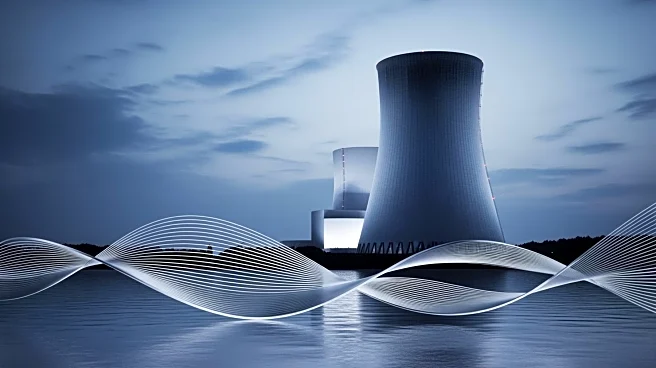What's Happening?
The UK government has announced the selection of Wylfa on Anglesey, Wales, as the site for its first small modular nuclear reactor. This project, backed by over £2.5 billion, is expected to create thousands of jobs in North Wales. The initiative is led
by Great British Energy - Nuclear, which plans to initially install three reactors from Rolls-Royce SMR, with potential expansion to eight reactors. This marks the first deployment under the UK's small modular reactor program, part of the government's clean energy strategy. The decision has caused tension with the United States, which had been advocating for U.S. energy firm Westinghouse to lead a large-scale project at Wylfa.
Why It's Important?
The UK's decision to proceed with a British-built small modular reactor instead of a U.S.-led project has significant implications for international energy relations. It highlights the UK's commitment to advancing its clean energy strategy independently, potentially affecting U.S. interests in the nuclear energy sector. The move could influence global nuclear energy dynamics, as small modular reactors are seen as a promising solution for achieving net-zero industrial energy use. The project also underscores the UK's focus on domestic energy production and job creation, which may impact future collaborations with U.S. energy firms.
What's Next?
The development of the nuclear reactor in Wales is expected to proceed with the installation of the initial three reactors. As the project unfolds, it may prompt further discussions between the UK and U.S. regarding energy collaboration and competition. The UK's clean energy strategy could serve as a model for other countries considering small modular reactors. Additionally, the project may lead to increased investment in nuclear technology and infrastructure within the UK, potentially influencing energy policies and market dynamics.
Beyond the Headlines
The decision to build the nuclear reactor in Wales may have broader implications for the UK's energy independence and its role in global clean energy initiatives. It could also affect the geopolitical landscape, as countries navigate energy partnerships and competition. The focus on small modular reactors reflects a shift towards more sustainable and efficient energy solutions, which may drive innovation and regulatory changes in the nuclear industry.














